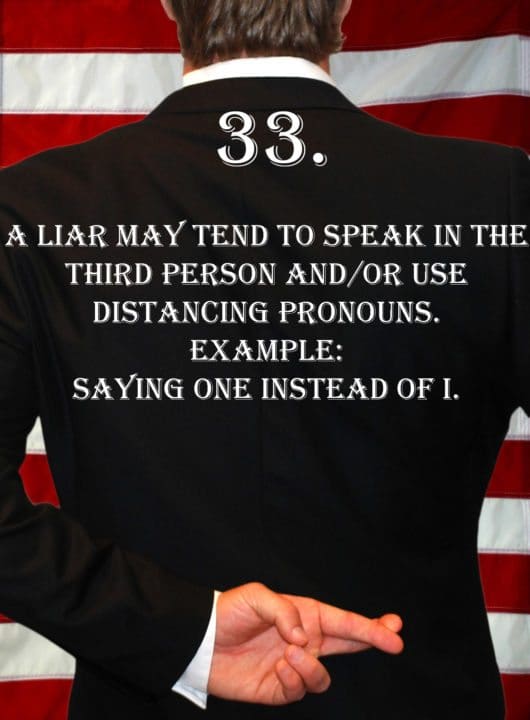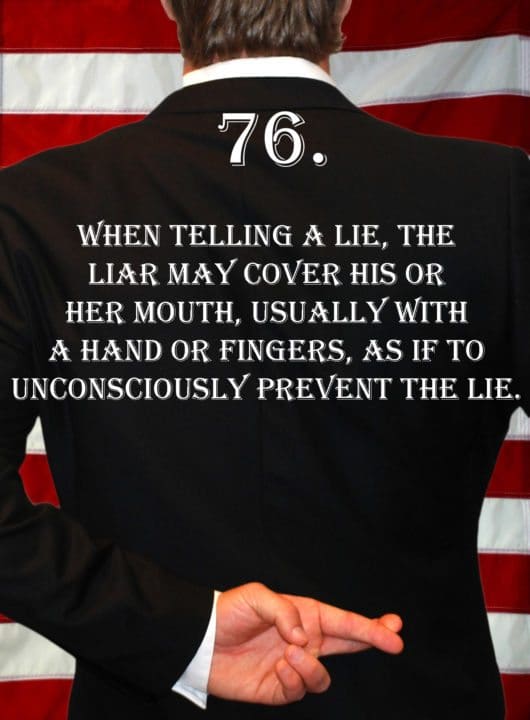
Deception Tip 90:
When questioning someone, purposefully get some facts wrong, or diminish their pride. This will tempt them to correct you and reveal their story.
Listen To The Podcast!
E90 – Wrong Facts – Deception Tips Podcast – Click Here To Subscribe
Podcast Transcript
Hello and welcome to the Deception Tips podcast where you will learn amazing cues to detect deceit that will help you read people like never before. I’m your host Spencer Coffman, let’s get started.
Hello and welcome to episode 90 of the Deception Tips podcast. It’s been a great journey, we’ve got 11 episodes left, and we go to 101, so I guess, technically, it could be 12 episodes left but 90 to 101, 11 really, if you count this one, 12, you got the idea.
We’re almost there, we’re making progress, and you’re learning a lot about reading people and detecting deception so that you will be able to tell whether or not someone is lying to you.
Why is this important? Well, you pretty much know why it’s important but it never hurts to restate the facts. It’s important because people lie all the time, every single day, you are on the receiving end of over 200 lies a day, 200. How many of those are white lies and mean nothing and how many could actually hurt you and are serious? We don’t know but, hopefully, none of them.
However, if you know how to read people and detect this deception and spot these lies then if one or two or 10 of those could be potentially harmful, you have saved yourself from that hurt, from whatever it is that is going to harm you in that lie.
That is why it is important, you need to protect yourself and others, those around you, those you love, from lies and deception and hurt and deceit. It is a painful process once you find out the truth, the truth hurts.
Last week, we talked about how liars forego the use of regulators. Well, what are regulators? Regulators are all of those little things in sentences and in our speech that tell us or give us meaning and context. Things like commas, periods, question marks, exclamation points, and those types of deals. They are the pauses and stops in a sentence.
They are the things that allow us to interpret the meaning of the words on the page, it’s the emphasis. Liars will forego those because they’re not thinking about that, they are thinking only of getting their lie out, speaking it as fast as possible, getting it out, telling it, hoping someone believes it. That is what they are doing, they are pushing that lie very quickly.
As a result, they will often interrupt people or cut people off to get their story out. They may take over and dominate the conversation or the meeting or whatever it is because they want that out. Remember that battle between the conscious and the unconscious, it’s raging, it’s so heavy that there is that strong desire to talk and to get their story told.
The conscious wants the lie, the unconscious wants the truth, and the conscious wants to tell that lie as fast as possible. They are trying to convince all of those around them that that lie is true.
Not only that but they are trying to convince themselves that the lie is true. Therefore, they will forego these regulators most of the time. It won’t happen every time but when you notice it, ping it up as a potential sign of deception.
As you know, any one sign is not indicative of deception or not conclusive of deception, you need multiple signs, multiple gestures, and behaviors. You need to find a pattern or a cluster of behaviors, so let this ping your sensors as a potential sign of deception and then look for the patterns and clusters around it.
Today, we are going to talk about another sign, this one is kind of a play on your suspects. So, you are going to be saying things or doing things to rattle their cage a little bit and get them to talk, get them to correct you.
This one plays on their smugness, their pride, their contempt, it plays on their arrogance. If you see people who are feeling overconfident or superior, if they’re displaying different behaviors, maybe they’re leaning back in their chair.
Maybe they’re putting their feet up, maybe they’re steepling their fingers, we talked about Steepling Fingers in episode 75. If you see any of those smug-type behaviors then you may want to use this tip because it will get them to start telling more or start correcting you, they may believe you’re wrong.
We’ve talked about this here and there throughout all of the deception tips, that sometimes it’s okay to purposefully get things wrong so that they will correct you.
I mentioned before that we will have a whole episode dedicated to that and here it is, this is the one. This is the episode that I was talking about and hinting at where it is okay to get things purposefully wrong for the reason of getting them to correct you.
So, here it is, this is Deception Tip number 90. When questioning someone, purposefully get some facts wrong or diminish their pride, this will tempt them to correct you and reveal their story. Here it is again, Deception Tip number 90. When questioning someone purposefully get some facts wrong or diminish their pride, this will tempt them to correct you and reveal their story.
Why is this important? Why would they correct you, they’re lying anyway, so why would they want to correct you? Well, it depends on what you get wrong.
If you’re purposefully agreeing to a lie that you know is false, then they’re going to agree with you all day long because they want you to believe that lie. However, if you misinterpret that lie and you say something or believe something that is even worse.
You are convinced that okay, maybe they didn’t commit the murder but boy, after your story and after this, I know for a fact that you did X, Y, Z, or you helped out this other crime that we’re trying to solve. There was a bank robbery and you must’ve aided and abetted by blocking the police officer because he was asking you about the murder.
You can concoct any type of deal, it could even be outlandish and it could be something that puts them in a different situation that, all of a sudden, they are scared about. We’ve talked about this before and it was in Suggesting Consequences where you have them suggest their own consequence or you accuse them of a greater crime.
So, we’ve talked about it twice, having them suggest their own consequences is like this but it gets them to start talking. Generally, they’re going to suggest a lesser consequence than they should.
So, in this circumstance, if you accuse liars, you accuse them of a greater crime, chances are they’re going to fess up to the lesser crime. Why? Because they don’t want to be convicted of a crime they didn’t commit.
So, Suggesting Consequences was episode number 27, and Accusing Liars was episode number 26. You can go and review those at your leisure but anytime they are accusing a liar of a greater crime, chances are the liar is probably going to fess up to that lesser crime to avoid the greater consequence, that is what this is like.
If you purposefully get some facts wrong that may lead them down a nastier path, they may correct you to try to get themselves back on the lesser of the consequence.
What that might do is get them to trip over their tongue and reveal some things that they weren’t saying before. That opens up a little thread for you to pull on and get to and we’re going to talk a lot more about it coming up right after this.
Join the thousands of Deception Tips blog followers on Tumblr. Share your thoughts on the podcast, the videos, and the books. Find it today on tumblr.com.
Welcome back to episode 90 of the Deception Tips podcast. Today, we’re talking about the importance of purposefully getting some facts wrong and what it does. Well, it does a thing in the liar’s mind.
The conscious and unconscious are battling and the conscious wants that lie to be believed, the unconscious wants the truth to come out. So, if they think that they’re convincing the target, they’re starting to get a little proud.
They’re starting to get a little arrogant, you may be witnessing other behaviors such as contempt, in episode 19, we talked about that. The Steepling of Fingers is more of an arrogance or confidence behavior, we’ve talked about that in episode 75.
Also, they may start to put their feet up or they’re taking up some more space. They’re starting to sprawl out because they’re feeling a little bit more comfortable with the situation.
They’re believing that you or that the target is believing their lie, Take Up Space was episode 40. If they start to feel that way then you can use this tactic to diminish their pride, you can start to get some things wrong in their story.
So, if they’re telling you one thing and you say, alright, I’ve got it now, I understand. You give them back your interpretation of their story and there are a few key details that are messed up.
Maybe it’s things that aren’t even that important but they might be important to them. If they said, it was around four o’clock, you may get it wrong or you do it frustratingly. You say, ‘okay, so 4:00 AM…’ ‘No, you idiot, four in the afternoon’, things like that.
Maybe you purposefully switch around some details that are minor, that makes you seem a little bit stupid, like an inspector Cluzo type of a person who gets it all messed up but in the end miraculously solves the case.
If you get them to be a little bit more frustrated with you like you’re incompetent, then they might reveal some of the other parts of their story that they weren’t revealing before. Where it’s really effective is in saying things that are bringing on an accusation of a stronger crime.
So, you’re talking to them about stealing something then all of a sudden, you get their story wrong and you say that they stole way more. Now they’re up for a bigger punishment or in that theft, maybe they had a gun, so now it’s armed robbery, which is even greater. They might say, no, no, no, I didn’t have a gun, I had X, Y, Z. Oh, okay, so you do admit to having this knife that we found at the scene or whatever the case may be.
The point of this is, if you purposely get some facts wrong that they are working so hard to get you to believe, they are going to start becoming a little bit angry, a little bit more frustrated, and a little bit irritated with you. You say, well, what good is that going to do? Remember there is a huge battle going on between the conscious and the unconscious.
What is this battle doing? This battle is welling up inside of them with stress and tension, they are filled with stress. We’ve talked about all of the different reasons why they’re stressed about telling the lie. They’ve rehearsed the lie, they practiced the lie, they want to tell it. They’re also stressed about whether or not the person is going to believe the lie.
They’re stressed about getting caught for the crime they committed, they’re stressed about getting caught for telling the lie. They’re also stressed about the consequence of telling the lie on top of the consequence of the crime. Now they also want to make sure that they believe their own lie. There are a lot of things that they’re worried about at this moment in time.
Therefore, if you add to that stress and worry by being a little bit incompetent and by getting them to be a little bit angrier and frustrated with you, their emotion is starting to take the lead. Any time emotions dictate behavior, it is a recipe for disaster, which means something is going to happen.
Whether they slip up in some loophole and allow you to open it up and follow that new path and examine the story a little deeper or call them out on the different contradictions, that is going to be a situation by situation. Either way, this tactic is a good way to get them to start talking more, especially if they feel they need to convince you and help you get the story straight.
They’re going to start talking a lot more because they want to make sure you get it. You are the only thing standing between them and their freedom right now.
They need to convince you so that you can go convince whoever you need to convince or write it in your report. If you’re getting the story wrong and you’re putting it into a report incorrectly, they’re going to know that things aren’t really going to work out.
They will want to make sure that their case is heard properly, they want their side of the story told. It’s a human nature condition, we want to make sure that we are understood and that people know where we are coming from, we want them to understand this. That is something we talked about before with Relating Language, how people want other people to relate to them.
We want to feel like we are understood and we want to feel like people care or that people know exactly what my side of the story is. Again, that’s something that is a human nature condition, so in Relating Language, we talked about that in episode number 84. The bottom line, if you purposefully get some facts wrong, let them think that you don’t quite know what’s going on. They will be tempted to correct you and they may open up some contradictions in their story.
So, I want to thank you for listening to this week’s episode of the Deception Tips podcast. I hope that you’ll share it with your friends, subscribe to the feed, check out the Deception Tips videos, the blog and take a look at the books I have available, and, as always, tune in next week for a new deception tip.
Video Transcript
Hey guys, my name is Spencer Coffman, thank you for watching the Deception Tips videos. They’re all about teaching you how to read people and detect deception so that you will be able to tell if someone is lying to you. Today, we’re going to talk about a tactic that you can use when you are trying to detect deception and read people to get to the bottom of something, to determine whether or not someone is lying.
This tactic is something that you’ll do, liars are stressed and tense already, so you’re going to take that stress and that tension and just push them over the edge a little bit. So, here it is, this is Deception Tip number 90. When questioning someone, purposefully get some facts wrong or diminish their pride. This will tempt them to correct you and reveal their story.
So, there are a couple of parts to this, when you’re questioning them, so this isn’t in a normal conversation, this is more like when you are trying to get to the bottom of something. You’re already past the normal conversation, you may know that they’re being deceptive at this point and its sort of borderline interrogation here, you’re questioning them.
They’ve already told you their story a few times, maybe you’ve gone over it a couple of times and they’ve already said some stuff. What you’re going to do is purposefully get some facts wrong. So, if they’ve told you that it was at three o’clock that they went somewhere, you’re going to repeat it and say, at four o’clock you said you went to the gym.
No, I went through at three, I’ve told you that. You’re going to frustrate them just a little bit more, like in the movies where you see these movies and there’s the client or the friend or the assistant or someone usually in the lower position. Then there’s that boss that’s a little bit more arrogant and they’re in charge, maybe they’re the lead detective or some sort of status position.
They’re always getting that other person’s name wrong, hey, Jacob, no, it’s Jason, hey, Jonas, come with me, no, it’s Jason, I’ve told you over and over. They just keep going like that and it’s throughout the whole movie and at the end of the movie they get their name right and it’s a touching moment, something like that. It’s that type of frustration that you are trying to convey to the person that you’re interrogating.
Again, as I said, they have a certain story that they’ve told you over and over and over, every time you’re going to mess up on one detail. You know the right answer, you know what they’ve told you, you’re purposefully getting some facts wrong, you’re purposefully making a mistake. They are going to correct you over and over again and they’re going to wonder why you are being such an idiot, you can’t even get my story correct.
You are doing this because it’s going to make them more frustrated, more tense, more irritated. Remember that battle between the conscious and the unconscious, they’re going head-to-head in their minds and they are already on edge, they’re already frustrated, they’re already irritated. So, by doing this you are going to push them over the edge, they’re going to keep correcting you.
Eventually, they’re probably going to correct you in such a way that they slip up and reveal the truth. So, it’s important, don’t simply mix up any little detail, mix up a detail that you think is in the heart of their lie. If you know pretty much their whole story was true except at four o’clock, I don’t really think they went to the gym, I think they might have gone somewhere else. So, that would be the detail you want to mess up.
Whatever you think that they are lying about and you know based on the patterns and clusters of behavior which area of their story is a little bit off, that’s what you want to mess up. Then as they keep correcting you, eventually, they might correct you and the truth slips out and bam, you’ve caught them in their lie, now you know what is true and you can expound on that. So, keep that in mind, pick the detail properly and you want to frustrate them a little bit more to get them to crack.
So, if this is your first time watching these videos, I’d love to have you subscribe to the channel on YouTube. Feel free to comment with any questions you may have as well. Also, if you’d like some more information, we have books, blog posts, and podcasts all available on spencercoffman.com that are dedicated to teaching you exactly what every body is really saying.
Until next time.






